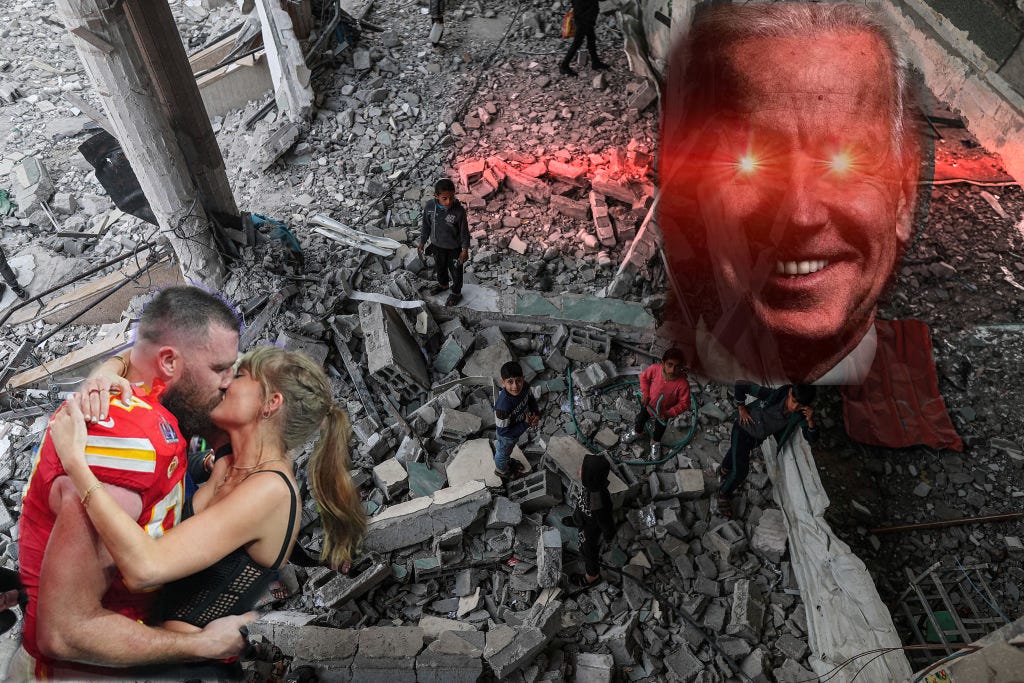The Politics of Super Bowl 58: You Can't Escape It
Super Bowl 58 was thrilling, but it also demonstrated the intensely political dimensions of the event in perhaps the most bizarre and horrifying ways imaginable.

The 58th Super Bowl was an astounding affair and provided no end to conversation fodder for the offseason. There are conversations about quarterback Patrick Mahomes’ growing legacy, the apparent fact that a number of 49ers players didn’t know the new playoff overtime rules, the dominance of defensive coordinator Steve Spagnuolo, the Sisyphean failure of head coach Kyle Shanahan, commentator Tony Romo’s performance and on and on and on.
More than most Super Bowls, there are countless narrative threads to unravel. And it helps that the game was incredible, too.
But it’s also difficult to ignore the cultural and political context of the Super Bowl, occurring against the backdrop of one of the most contentious international conflicts in recent history with the most famous pop star in the world centered as a storyline. It is perhaps desirable to say that the Super Bowl is “not political” but it is not practical.
The Super Bowl Is Always Political
The very fact that the Super Bowl is culturally significant means that it plays a role in shaping our behaviors and plays its own part in determining the norms within society, no matter how scant. But on top of that, political actors attach themselves to culturally significant events like the Super Bowl in order to align their perception with those values.
That’s nothing to say of the massive logistical and political effort involved in bringing the Super Bowl to a host city. I’ve written before about how cities will use hosting a Super Bowl as a means of papering over their biggest problems; in Los Angeles that meant violent – and sometimes deadly – efforts to “clean up” settlements of unhoused people in violation of the law and human dignity.
The preparation process for hosting an event like the Super Bowl, along with the costs of the event itself, frequently overshadows any economic benefit a mega-event may provide. The costs of providing city services like logistical support, police overtime, parking spaces and so on aren’t wholly picked up by the NFL and borne by the city itself – running into the millions of dollars.
In the meantime, the usage of exclusive vendors, in-house services and national chains often means projected economic benefits flow out of the city rather than in. Tax exemptions designed to entice the NFL into a host city rob the city of projected revenue.
Most Super Bowl economic projections also do not account for the substitution effect – the impact of potential tourists or city visitors altering plans or leaving to avoid the Super Bowl – as well as the impact of lost productivity at a host site as visitors and laborers are cleared out of location after location to set up for the event’s festivities.
While it is possible for the event to provide a benefit in a vacuum, the Super Bowl is often used as an inducement for cities to build stadiums, which almost never return value, draining rather than helping local economies. They happen to also operate as enormous subsidies to wealthy and well-capitalized organizations and their owners, whether or not ownership of the venue is officially transferred to the franchise.
There are also massive federal outlays for security. As has been the case every year since 2001 and remains true this year, the Super Bowl is stocked to the brim with federal agents from the Department of Homeland Security.
Independent journalist Ken Klippenstein detailed this year’s effort in Las Vegas. There were “no known, credible or specific threats” according to DHS Secretary Alejandro Mayorkas and they spent much of their time and resources protecting the NFL’s intellectual property rather than protecting people.
The NFL Benefited From the Distraction

The Super Bowl provides fantastic cover for cities hoping to ignore internal municipal problems but it also gave the NFL tremendous cover this year. Shortly before the Super Bowl, the Washington Post dropped a massive investigation into the NFL’s alleged mismanagement of the concussion settlement they were forced to provide following a protracted lawsuit involving 5,000 former players.



